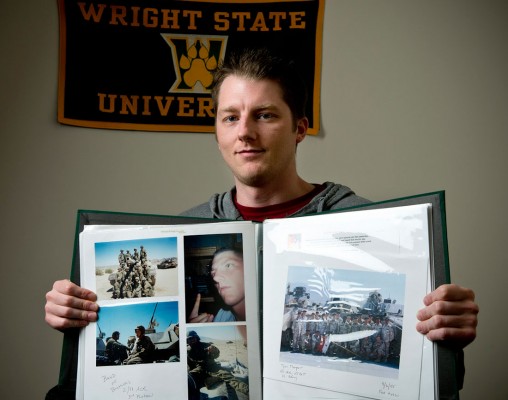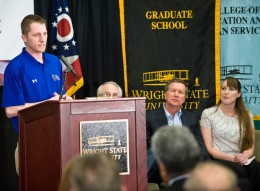
After tours in Iraq and Afghanistan, Tyler Thompson returned home with PTSD. Now he wants to help veterans get the care they deserve.
Tyler Thompson spent seven years in the U.S. Army, deploying to Iraq and Afghanistan. When he returned home after tours in each country, he suffered from PTSD.
It took him a long time to get the help he needed, but he finally did. Now he wants to help veterans facing similar challenges.
He’s working toward that goal as a student leader in the Wright State University Veteran and Military Center and by majoring in rehabilitation services so he can work with veterans after he graduates.
“We just have so many men and women come back with mental health problems,” said Thompson, who is a junior. “I’ll have experience in the field and I’ll have the education.”
“I can help people out just like myself,” he said, “and it helps me too.”
Thompson joined the Army in 2002 and spent nearly two years in Iraq as an armor crewman, holding various positions like tank driver, tank loader and tank commander. When his stint ended in 2006, he returned to Richwood, Ohio, where he grew up and attended Marion Technical College, receiving an associate degree in criminal justice.

Tyler Thompson was invited to speak on behalf of veteran students during a visit to Wright State this spring by Ohio Gov. John Kasich.
At the time, he was experiencing problems because of post-traumatic stress disorder, though he didn’t know he had PTSD. He initially visited the VA, but says he was too proud and stubborn to actually seek help. He concealed his depression from others.
“I didn’t tell anybody in the world that I had any problems because I thought that I was the only one,” he said.
Thinking civilian life wasn’t for him, he rejoined the Army, this time serving with the 2nd Infantry Division based in Fort Lewis, Wash. In 2009, he deployed to Afghanistan, where he served until 2010.
After he returned from Afghanistan, Thompson’s mental health worsened. He was angry, depressed and suicidal. “I had three, four years where I didn’t feel anything at all,” he said. “Didn’t feel happy, didn’t feel sad.”
“My problems were so bad I tried to continually bottle it up and tried not to let anyone see there was anything wrong with me,” he recalled.
But others did notice something was wrong and urged Thompson to seek help. Eventually, he started receiving therapy. “I’ve learned to turn the volume down quite a bit,” he said, “just tone it out so I can do stuff that’s more important.”
One of the things that’s important to Thompson is his role as a Mission Continues fellow in the Veteran and Military Center. Founded in 2007 by a former Navy SEAL, the Mission Continues is a nonprofit organization that offers post-9/11 veterans fellowships and other opportunities to perform community service with local nonprofits.
As part of his fellowship, Thompson created a veterans-only orientation program and a peer-mentoring program for new students who have military experience.
Working with the Transfer Student Resource Center, the Veteran and Military Center will pilot the orientation program in May and fully launch it this fall. The orientation program is tailored for veterans and will include topics like GI Bill benefits that do not affect traditional students.
The mentoring program, called the Battle Buddy Program, is designed to help veterans transition to college life and introduce them to the veteran community on campus. New students will have a mentor and will receive help with academics, GI Bill benefits and other needs.
The idea behind both the orientation and Battle Buddy programs is to create a tight-knit group of veteran students who feel like they belong at Wright State.
“We want to make it a special place for them,” Thompson said. “We want them to really feel like they belong here.”
Thompson’s fellowship in the Veteran and Military Center is only one of the significant changes at the center this year, said Seth Gordon, Ph.D., the center’s director. The center has expanded its role beyond GI Bill processing to focus on academic success and advocacy, leadership and career development, and community building.
“As a Mission Continues Fellow, Tyler is focused on assisting veterans, particularly post 9/11-veterans, with their transition into college,” Gordon said. “Being a pioneer can be difficult, and Tyler’s good-natured flexibility and resilience has proven to be a great asset.”
When Gordon encouraged him to apply for the Mission Continues Fellowship, Thompson was initially hesitant to get involved because he wasn’t sure if he was ready to make a big commitment.
Now he’s glad he did. “It was a game changer,” he said. “It changed my life.”
The fellowship has given Thompson the confidence to do things he normally wouldn’t do. That includes speaking on behalf of veteran students during a visit to Wright State this spring by Ohio Gov. John Kasich.
As Thompson has gotten more involved on campus, he has realized people rely on him—just like in the Army. He has also embraced the idea that he represents student veterans on campus.
“I want people to know I’m someone they can depend on, someone who is responsible and dedicated to their cause,” he said. “I want people to know I’m passionate about veterans.”

 Wright State names Rajneesh Suri dean of Raj Soin College of Business
Wright State names Rajneesh Suri dean of Raj Soin College of Business  ‘Only in New York,’ born at Wright State
‘Only in New York,’ born at Wright State  Wright State president, Horizon League leaders welcome new commissioner
Wright State president, Horizon League leaders welcome new commissioner  Wright State celebrates homecoming with week-long block party
Wright State celebrates homecoming with week-long block party  Wright State baseball to take on Dayton Flyers at Day Air Ballpark April 15
Wright State baseball to take on Dayton Flyers at Day Air Ballpark April 15 